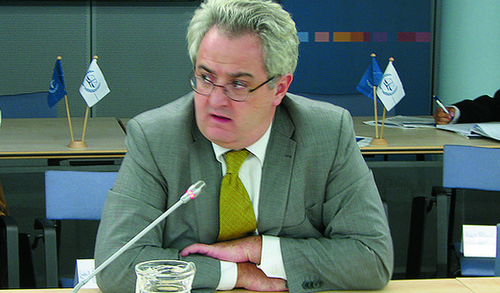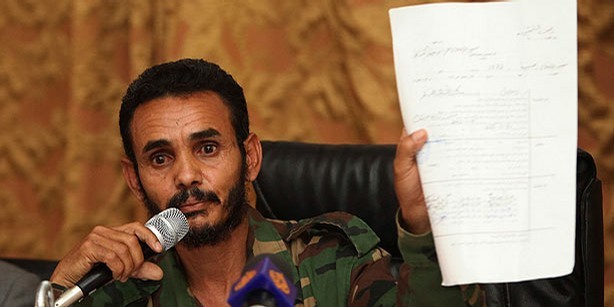In times of crisis or scandal, misunderstandings are an unfortunate but inevitable consequence of not having sufficient information and only getting it in fits and spurts from political actors with competing interests. The continuing controversy surrounding the detention of ICC staff has been no exception. Since their visit to Saif al-Islam Gaddafi in early June, Melinda Taylor, Helene Assaf, Alexander Khodakov, and Esteban Peralta Losilla have been held by a militia from Zintan, Libya, for the most part incommunicado. Libyan and Zintani authorities alleged that they were spying and posed a threat to the country’s national security (for more see here and here).
Admittedly, I was amongst those who believed that after the story broke, it would slowly decline in coverage and be largely ignored by the media. However – and luckily – that has not been the case. Nevertheless, the relatively consistent coverage has not prevented fictions from sprouting and falsehoods from propagating. For this reason, I thought it might be useful to “clear the air” by doing a little exercise in separating fact from fiction.
————————
1. There is evidence that the ICC staff are guilty of breaking Libyan law, undermining Libyan national security, and violating the ICC’s protocols.
Fiction. The claim that the ICC staff must be guilty is unfortunately widespread. Remarkably, commentators acting as both judge and jury have seemingly convicted the ICC staff without trial, indeed without evidence. While there have been proclamations that Melinda Taylor smuggled secret and coded documents as well as a camera pen into her meeting with Saif, absolutely no evidence has been given to date by the Libyan authorities to indicate that this has indeed occurred or that the staff are guilty of any wrongdoing. The closest we have come to actually seeing any evidence came when the arrest of Taylor et al was announced and a Zintani militia leader waived the alleged documents in front of the camera. Importantly, this is not to suggest that the ICC staff haven’t done anything wrong. Some might argue that the ICC’s recent statement of regret regarding the situation implies a concession that something went awry when the staff met Saif. However, we simply do not know what occurred during the meeting between the staff members and Saif. It bears repeating: No evidence of wrongdoing has been brought forward. None.
2. The ICC apologized to Libya.
Fact. There is probably not enough agreement on this to outright declare that it is a fact but I continue to believe the ICC’s statement amounts to an apology, as do others. The ICC’s statement amounted to an apology without saying sorry. It is not an uncommon practice for state or international actors to express an apology for past injustices but avoid using language that they fear may make them liable to subsequent legal action.
In this context, it is worth considering that the ICC’s statement is much closer to an apology than, for instance, former US President Bill Clinton’s “apology” for inaction in the face of the Rwandan Genocide.

Esteban Peralta, one of the ICC staff who has remained in Libya since Melinda Taylor was arrested in order to provide her moral support.
3. Only Melinda Taylor is being held in detention for threatening Libya’s national security.
Fact. Originally, it appeared that both Helene Assaf and Melinda Taylor would be charged in Libya. In a show of remarkable solidarity and integrity, after being told the were free to leave Libya, Alexander Khodakov and Esteban Peralta Losilla chose to stay with Assaf and Taylor for “moral support”. While the circumstances are unclear, it recently became clear that Assaf was also free to leave. All three remain with their colleague but it seems clear that only Taylor is being held in detention.
4. Taylor is being held under terrible conditions.
Fiction. It appears that all of the staff are being held in adequate facilities. On both occasions when Taylor was able to communicate with Australian representatives, it was reported that her treatment was good. However, until yesterday none of the four ICC staff were able or allowed to communicate with their families. Moreover, it has been reported that Taylor is being “interrogated” by Libyan authorities and it remains unclear what such interrogation entails. From Libya’s letter to the UN Security Council, however, we do know that Taylor has refused to cooperate with Libyan investigators and has requested international legal counsel.
5. ICC staff are entitled to diplomatic immunity.
Fact. While not everyone agrees, the consensus appears to be that ICC staff on official duty have diplomatic immunity. This has been argued by international criminal law luminaries Kevin Jon Heller and Dapo Akande. What is particularly interesting is that while Heller and Akande don’t take the same route of legal reasoning, they come to precisely the same legal conclusion: that the ICC staff are entitled to diplomatic immunity.
6. If the ICC staff are released, the ICC will provide them with immunity from investigation and/or reprimand.
Fiction. The ICC has been clear that it can and will investigate the staff for any alleged wrongdoing. An issue from the get-go has been a conflation on the part of commentators that diplomatic immunity meant impunity. Ironically, I would think the ongoing detention of the ICC staff makes it increasingly unlikely that the Court can legitimately admonish any alleged wrongdoing, although it is too early to speculate.

Zintani commander, Ajmi al-Atiri, speaks at press conference regarding the detention of four ICC staff members and holds up papers that Taylor allegedly gave Saif al-Islam Gaddafi (Photo: AFP)
7. The situation will be resolved through negotiations between Libyan authorities and the ICC.
Fiction. By all accounts, Taylor remains in Zintani detention. Importantly, this is the same Zintani militia that, after capturing Saif al-Islam Gaddafi, successfully used him as a political bargaining chip. The biggest surprise in Libya’s interim cabinet was the appointment of a Zintani militia leader to the Defense Ministry, which most observers link to the militia’s custody of Saif. The Zintani militia is likely doing the same with Taylor’s freedom although it is important to note Libyan officials also appear to be seeking dividends from her arrest (see below). In short, current negotiations between the ICC and Libyan officials are necessary but at some point they will need to get the buy-in from Zintani authorities.
8. This is about the law not politics.
Fiction. It seems rather clear to me that any consideration of international law has largely flown out the window by now. This has been particularly clear ever since a Libyan spokesperson discussed the situation and claimed they were leveraging Taylor for information regarding the whereabouts of a key Gaddafi regime figure, Mohammed Ismail. We have been far too quick to forget the words of Mohammed Al-Hareizi:
“We want this guy. It is very important to catch this guy because this guy is very, very, very danger(ous) for us…
…We don’t have anything against this woman. Just we need some information from her, after that she will be free.”
————————
Hopefully these points help clear up some of the confusion. Most importantly, there is absolutely no doubt that the ICC staff members should be released and returned to their families.



Resolution 1970 of United Nations Security Council stresses that ‘the Libyan authorities shall cooperate fully with and provide any necessary assistance to the Court’. Under Article 18 of this agreement ICC staff members, as counsel and persons assisting defence counsel, share:
– Immunity from personal arrest or detention and from seizure of his or her personal baggage.
– Immunity from legal process of every kind in respect of words spoken or written and all acts performed by him or her in official capacity, which immunity shall continue to be accorded even after he or she has ceased to exercise his or her functions.
– Inviolability of papers and documents in whatever form and materials relating to the exercise of his or her functions.
– For the purposes of communications in pursuance of his or her functions as counsel, the right to receive and send papers and documents in whatever form.
In an article on Tripoli Post (http://www.tripolipost.com/articledetail.asp?c=1&i=8540 ) it is exposed how the Libyan authorities violated each of those four principles.
What more should one comment?
hypotheticaly u.s. arrests osama then his lawyers bring him documents and letters from sme wanted terrorists to sign all in e name of rights to legal counsel,,,this man is no saint,,,he sent jets and tanks to bomb and kill thousands of protesters calling them rodents and cockroaches a point all of u seem to be missing , he held libyan prisoners in e very same cells that the icc now say are not fit for habitation,,his,,,,why don’t we just build him a mansion to trie him in,..
I really appreciate this post. It’s nice to a clear account of the case and what has transpired. As for Eef Van Beveren’s comments, also much appreciated. I feel the violation of all of the above principles illustrates exactly why the ICC continues to fight for Seif al-Islam Qaddafi’s extradition to the Hague. The rule of law has yet to be established as a respected entity in Libya. Therefore, the chances of a fair trial for someone of his stature is unlikely. This case also illustrates just how important it is for the future Libyan government to achieve a monopoly on violence (i.e. disarm militias) if it is to be successful. I truly hope that the Libyan people will be able to achieve this success on their own terms, without losing what they fought for along the way.
akathemusings.blogspot.com
http://www.icc-cpi.int/NR/exeres/88262EBD-A29B-450F-9B2D-C30D3D7F1DAB.htm
secondly immunity does not imply impunity to e nations laws,,,it is plain folly to assume libya will fully cooperate with e defense counsel if it is found/alleged/suspected to be collaborating with a fugitive who is also wanted by the icc itself,while it is regrettable e lawyer was detained,,e response from the icc serves to confirm that taylor myt hv erred and her alleged actions myt actually hurt any future cooperation on e continent and gv dictators smthn 2 point @ for refusing cooperation wth e court or other international orgs …lastly e never ending cases at e international court wc in cases take decades to conclude do not inspire confidence and dare I say in future scenarios incourage summary executions to avoid e mentaly n financialy taxing legal battles